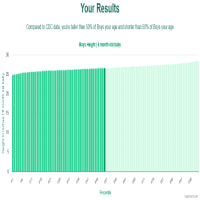Boys Height chart for babies 6 month old baby

General Summary: 6 month old baby boys height
In most cases, height measurements for 6 month old baby boys will be in the range between 62 and 69 cms. The average height for 6 month old baby boys is 66 cms, according to the CDC and anonymized data from users.
All Results
Enter your height measurements above to see how they compare
So far, we have recorded 0 height measurements for 6-month-old-baby boys on LifeMeasure!
(chart updates daily)
Growth and Development of 6-Month-Old Boys:
Height and Percentiles:
Congratulations on your baby boy reaching six months old! At this stage, the average height for six-month-old boys is typically around 26 to 28 inches (66 to 71 centimeters). Remember, every baby grows at their own pace, and there is a wide range of normal growth. Healthcare providers use growth charts to monitor your baby's growth and compare it to percentile ranges based on age and gender.
Here are some percentile ranges for reference:
5th percentile: Approximately 25 inches (64 centimeters)
50th percentile (average height): Around 27 inches (69 centimeters)
95th percentile: Approximately 29 inches (74 centimeters)
These percentiles can give you an idea of how your baby's height compares to other six-month-old boys.
Physical Development:
At six months old, your baby boy's physical development continues to progress. He may have good head control and be able to sit with some support. Some babies may even be able to sit briefly without assistance. Rolling from tummy to back and back to tummy may become smoother and more coordinated. Your baby may also start showing interest in reaching for objects and grasping them using his hands.
Feeding and Nutrition:
Feeding continues to be important for your baby's growth and development. Whether you are breastfeeding or using formula, continue to offer frequent feedings on demand, responding to your baby's hunger cues. By six months old, many babies are ready to start solid foods, such as pureed fruits and vegetables, under the guidance of a healthcare professional. Introduce new foods one at a time and watch for any signs of allergies or sensitivities.
Sleep Patterns:
By six months old, your baby may be establishing more predictable sleep patterns. While every baby is different, he may sleep for approximately 14 to 15 hours a day, including nighttime sleep and naps. Some babies may start to consolidate their sleep and have longer stretches of sleep at night. A consistent bedtime routine and a calm sleep environment can help promote healthy sleep habits.
Sensory Development:
Your baby's sensory development continues to advance at six months old. He may show improved hand-eye coordination, reaching for objects with more accuracy and purpose. Your baby's vision is developing further, and he may track moving objects with precision. He may also become more responsive to familiar voices and sounds, turning his head toward them and showing interest.
Cognitive Development:
At six months old, your baby's cognitive abilities continue to grow. He may show increased curiosity about the world around him, exploring objects and experimenting with different sounds. Your baby may be able to recognize familiar faces and respond to his name. He may also begin to understand simple cause-and-effect relationships, such as dropping a toy and realizing it makes a sound when it hits the ground.
Social and Emotional Development:
Your baby's social and emotional development flourishes as he interacts with others. At six months old, he may engage in more interactive play, showing excitement and joy. He may respond to your smiles and gestures, imitate facial expressions, and enjoy interactive games like peek-a-boo. Your baby may also show attachment to familiar caregivers and express emotions such as happiness, frustration, or sadness.
Parental Support:
As a parent, your role in supporting your baby's growth and development remains crucial. Continue to provide a loving and stimulating environment, offering opportunities for exploration, play, and interaction. Encourage your baby's efforts and celebrate his achievements. Trust your instincts as a parent and consult with your healthcare provider if you have any concerns about your baby's growth or development.
Enjoy this remarkable stage as you witness your baby boy reaching new milestones and discovering the world around him. These early months are filled with wonder and growth. Embrace the journey and cherish the precious moments with your little one.
Development Summary:
As a 6-month-old baby, your son may be able to:
Have good head control and sit with some support.
Roll from tummy to back and back to tummy.
Show interest in reaching for objects and grasping them.
Start exploring solid foods under the guidance of a healthcare professional.
Sleep for approximately 14 to 15 hours a day, including nighttime sleep and naps.
Demonstrate improved hand-eye coordination and tracking of moving objects.
Show curiosity about the world, recognizing familiar faces, and responding to his name.
Engage in interactive play, responding to smiles and gestures.
Express a range of emotions and show attachment to familiar caregivers.
Some tips
Thinking of introducing solid foods to your 6-month-old baby? If you’re not sure - or if your baby doesn’t seem to be interested in solid foods, ask your pediatrician.
Begin your baby’s solids diet with iron-fortified cereal and combine it with breast milk (or formula if you wish). As he gets used to solids, feed him strained vegetables and fruits, but do this one at a time - ideally over several days for each - to ensure he’s not allergic to any of the food.
Make sure you keep track of his reactions to certain food, such as rashes, vomiting, or loose bowel movement.
Remember that every baby develops at their own pace, and it's important to consult with your healthcare provider if you have any concerns or questions about your baby's development. In any case, your baby boy is now halfway through his first year! Enjoy this exciting phase of your baby's growth and continue to provide love, care, and support.
See more ages